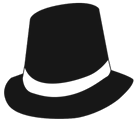 If you’re like many TeleRead community members, you read e-books off a cell phone or a dedicated e-reader—but you still use a PC or Mac as a library and management tool for them.
If you’re like many TeleRead community members, you read e-books off a cell phone or a dedicated e-reader—but you still use a PC or Mac as a library and management tool for them.
So which OS is the most hackerproof, given all the black hats out there?
Over at Yahoo News, Sean Captain compared the two and concluded: “Overall, Apple OS X is still a bit more secure than Microsoft Windows, but the gap keeps narrowing. Ultimately, the safest operating system is the one run by an informed user who knows how to keep it up to date, knows what to install, and knows what to remove."
Of course, the above hardly covers the waterfront. How about Linux machines, for example? What’s more, as Captain notes, browsers and plugins rather than actual OSes can be the real points of weakness.
Still, in the wake of the discovery of DYLD_PRINT_TO_FILE as a vulnerability in Macs running OS X 10.10 Yosemite, Captain’s piece is most timely.
What are your own thoughts on the security issue for desktops and laptops—and also for tablets with OSes also found in desktops?
Another post or posts can explore this issue in regard to other platforms.
Detail: If you’re really hacker-scared, you can always go for a Chromebook or Chromebox, at least once Calibre is finally available. Let’s hope that’s a when, not an if.
(Hat image via Pixabay. CC licensed.)
































With 90% of home-based computers being Windows computers and around 8% being Mac based, Windows computers are the most likely to be attached by hackers. The chances of making money are so much greater.
There are plenty of things that can be done to minimize susceptibility to hacking on a Windows computer. For example, all my Internet access runs through Sandboxie so that anything that gets downloaded is automatically sandboxed. Seems to me that is a good layer of protection.
Similarly, I use a high-rated firewall and antivirus/malware program and I don’t download from sites I do not know. And I do not click email links. I also use hard-to-break passwords and RoboForm to avoid having to type username and password information via the keyboard.
The result is that in the past 20 years I have not been hacked and have not had but once a virus. I did have an instance of a ransomware but I solved that problem by popping out my hard drive and popping in a clean, cloned hard drive. I was up and running in less than 5 minutes.
Whichever OS you use, make sure to back up all of your files regularly.
Am I the only person who keeps all his e-books backed up in the cloud so it doesn’t really matter what my desktop platform is? 🙂
Calibre2opds ftw. 🙂
I personally run my main Calibre library on Linux. I paid a lot of money for a good processor and lots of memory, so why would I want to bog it down with an antivirus, antispyware, antimalware and other antiCPU programs.
Plus, the probability that I will be hit by some virus or ransomware that corrupts my database is much lower on Linux.
I also keep several backup copies, some of them off-site.
For working with files I use Krusader that has an unique set of features, such as mixing of files and directories in one list (not directories at the top) that comes in handy when you have a list of book files mixed with some directories that also contain book. You want to know whether you have this book in epub or mobi format as well, so you can safely delete the directory containing html files (that were often created by unpacking said epub file).
I am fortunate, so I do not need to use plugins or tools that are Windows-only and do not run well under Wine.